- Home
- Maggie O'Farrell
This Must Be the Place Page 4
This Must Be the Place Read online
Page 4
I hesitated. I wanted to say I didn’t like the term ‘cured’ either. ‘I think he can be helped,’ I said carefully. ‘He can be helped a great deal. As a post-grad, I was involved in a research programme to help kids like Ari but it’s not strictly my line of—’
‘Come,’ she said, in the imperious manner of one used to being obeyed. I half expected her to click her fingers at me, like a dog-owner. ‘You can hold the jack while I tighten the wheel and you can tell me about this programme. Come.’
I thought: no, I won’t come. I thought: I won’t be bossed around by some hoity-toity madam. I thought: she’s used to getting what she wants because she happens to possess the face of a goddess. I thought: I will not come anywhere with you. But then I did. I steadied the jack while she replaced the wheel. I told her what I could remember about the dysfluency programme while she turned the bolts. I looked away, with effort, when the hem of her shirt got separated from the waistband of her overalls. I did what a good man might do: I helped, then left.
Later that night, I was lying on the bed in the B-and-B, contemplating the remains of my dope stash, which wasn’t, I was realising, going to last me until my return. How could I have neglected to buy enough at that dodgy bar in Dublin? I didn’t stand a chance in hell of getting any more around here. Would weed even grow in Ireland? I mused. Wasn’t there just too much damn rain?
There was a knock at the door and my landlady, a Mrs Spillane, a woman with hair that stood out around her head, like dandelion down, and an apron surgically attached to her front, stood there. I had hastily stubbed out the joint and done that pathetic smokers’ wave in front of me – why do we do that? – but her expression was that of a woman who knew she was being robbed but couldn’t yet prove it.
‘Mr Sullivan,’ she said.
‘Yes?’ I said. I even pulled myself straighter, as if to withstand and refute accusations of getting high, alone, in the middle of nowhere, thousands of miles from home.
‘This came for you.’ She was holding, I now noticed, a small parcel, wrapped in a calico bag.
‘Thanks.’ I put out my hands to take it but she pulled it away. She glanced up and down the corridor, as if checking for the presence of the FBI. ‘She wants to see you,’ she whispered.
‘Who does?’ I replied, noticing that I, too, was whispering. It appeared to be catching.
Mrs Spillane examined me at our new proximity. I wondered for a fleeting moment what she saw: a large American man, starting to grey at the temples, the whites of his eyes scribbled with red calligraphy? Could she read, in its runes, my jet lag, my long-term insomnia, a dope habit and unassailable paternal grief? Hard to tell.
‘She does,’ my landlady said, leaning forward, attempting what seemed to be a wink.
Dope makes most people paranoid but I couldn’t blame on the drug my ever-present sense that the world was against me: I’d had it even before I’d started out on this bender. What was she saying to me? Was I missing something?
‘I’m sorry,’ I began, ‘but I have no idea—’
She thrust the package into my hands. For a second, I had a mad notion that my ex-wife had somehow caught up with me and sent some noxious parcel: excrement, the semen of her lover, the severed head of the dog.
Then I looked down at the familiar blue tape bisecting some cardboard. It was Grandpa.
‘Oh,’ I said. ‘How did—’
‘You left it beside her car. When you were helping her.’
I clutched Grandpa to me. I remembered placing him to one side in order to winch down the jack but how could I have forgotten to pick him up?
‘Sorry, Grandpa,’ I muttered.
‘God rest his soul,’ Mrs Spillane said sententiously, crossing herself.
‘Yes,’ I said. ‘Thank you. Well,’ I reached for the door, ‘I think I’ll turn in and—’
Mrs Spillane put her hand on the door to stop it closing. ‘She wants to talk to you.’ She was whispering again.
‘Who does?’
She sighed, exasperated. ‘She does.’
‘You mean the – the woman with …’ I had, in my dope-addled state, to concentrate hard so as not to say the great rack, ‘… the hair?’
Mrs Spillane put her face close to mine. She was frowning, examining me, as if she had been considering buying me but was coming to the conclusion that I had too many defects.
‘Do you know how to find her?’ she whispered, with another glance over her shoulder.
‘What?’
Mrs Spillane hesitated. ‘You don’t know?’
‘Should I?’ I said, wondering how long she and I could go on conversing in questions.
‘She didn’t tell you?’
I was floored for a moment but then came back with ‘Why would she?’
Mrs Spillane said, ‘Hmm,’ thereby breaking the spell. She turned, abruptly, and said, ‘I need to make a telephone call.’
I was left there, with Grandpa, standing in the doorway. I shut the door and leant my head into its glossy wood. Something about seeing the water-flow grain of it at such close proximity made a decision rise in me like sap: I’d had enough. This cryptic nonsense was my breaking point. Enough with the rain, the dope, the evenings alone, the carting Grandpa about. Instead of igniting the rest of that joint, I was going to pack and drive to the airport. I’d get an earlier flight home: I’d got what I’d come for and I couldn’t take the surreal turn to the minds of the people here. I was a fish not so much out of water but way up the shore and over the beach road. I would leave Ireland and never come back. I would go home and try to repair what was left of my life.
I pushed myself upright. I crossed the room, flipped open my suitcase and started tossing things into it. I was dithering about how Grandpa should travel – carry-on or hold – when there was another knock at the door.
Mrs Spillane stood in the corridor, as before: the apron, the hair, the crossed hands. ‘She’ll be expecting you tomorrow,’ she said, in a hushed, sepulchral tone. ‘The crossroads at ten.’
‘Huh?’
‘I told her breakfast would be finished by eight thirty so you could come earlier but Claudette said ten suited her best.’
‘Hang on a second—’
‘I’m to give you directions to the crossroads. I’ll have a map for you at breakfast.’
She disappeared, stage right, and I was left staring at an open door.
Typical, I thought, slamming it. A woman like that would naturally have a pretentious name.
‘She couldn’t be called something like Jane or Sarah,’ I ranted to Grandpa, as I hurled books into my case. ‘No, nothing like Amy or Laura or Clare. It would have to be something foreign and fancy, like Claud—’
Halfway through uttering her name for the first time, something gave way. It was as if the bricks and timber of an edifice were falling all around me. I suddenly saw, I suddenly remembered where I’d seen her before. She had been a dancer. Or was it a doctor? I’d seen her as an amputee, a murderess, a detective, a nanny. I’d watched her be French, Spanish, Italian, Persian. She’d escaped death and she’d died of cancer, car accidents, pneumonia, tiger attack. She’d killed and been killed. I’d seen her be fifteen, I’d seen her be sixty. She’d fought, punched, stolen, lied, cheated, saved lives, given birth, given head, shot, swum, danced, dressed, undressed, over and over again, for all of us.
To apply the word ‘famous’ to her wouldn’t be entirely accurate. Fame is what she’d had before she’d done what she did; what came afterwards went beyond, into a kind of gilded, deified sphere of notoriety. These days, she was known less for her films than for having vanished right at the height of her career. Poof. Ta-da. Just like that. Thereby making herself into one of the most speculated-about enigmas of our time.
I don’t know if she’d thought ducking out like that would lessen her fame but it had only the opposite effect. The press tend not to take such temerity lightly and the celluloid geeks – those oft-bearded types who will recite ent
ire scripts at the drop of a hat, swap continuity errors or spot background cameos by pre-fame actors – even less so. She was still, however many years on, the subject of much debate. They were always wondering how she had done it, why she had done it, where she had gone, if she was still alive, who she might still be in touch with, and would she ever come back? They were forever trying to track her down, posting possible sightings of her on the internet, complete with smudged, grainy shots of someone who bore a passing resemblance to her. I’m not much of a movie-goer but even I knew the contours of her story: her relationship with that director, their controversial collaborations, her tempestuous reputation, then her disappearance. Hadn’t she attacked some journalist or photographer? Didn’t she walk out in the middle of making some movie, causing some major studio to go into receivership? Something like that. Whatever had happened, she had pulled off the thing that people of her ilk must dream about all the time: she’d left her life, she’d pulled the plug, she’d disappeared.
And I had found her.
There is a man at a desk. His head is bowed, forehead resting in his hands. The computer screen casts his hair, his clothes in a cool, leucistic glow.
There is a man at a desk and the man is me.
I sit there, in my office, head propped in fists. I see: the edge of my desk, the nap of my trousers, the heels of my shoes and, far below, a parallelogram of orange departmental carpet. I am still wearing my coat, still toting my bag. There is a vague smell off me, of offices, of crowded trains, of places I try to avoid. My bag jostles beside me in the chair, neither on nor off the ergonomically moulded arm, as if fighting for its share of space.
From beyond the door comes the sound of students, rolling along the corridor, chatting, complaining, shoving each other. The click-clack of heels. An electronic plop as a phone receives a message. Someone saying, who would have believed me, anyway? in a cross voice.
The lecture is delivered. The words have been spoken, the sentence deconstructed. The students have been enlightened as to the difference between pidgins and creoles. They have the theory of creole grammar, hopefully, tucked into their heads. I stood in front of them for an hour. I moved through the lecture. I gave eye contact. I allowed time for questions. I did what I’d come here to do.
And now? I am meant to be leaving for the airport. I should be collecting my things, getting my desk in order, answering a few final emails.
Instead, I am unable to do anything besides sit at my desk. My mind zigzags, like a bluebottle, from Brooklyn to Nicola Janks, unable to settle on either one. My father, this goddamn party, and now this.
I raise my head. In the searchbox of my browser are two words. They have been there since I got back to my office half an hour ago.
‘Nicola Janks’, my screen tells me, minuscule pixellations arranged to form the letters of her name. I don’t think I’ve ever typed it before, predating as it did the arrival of computers in my life. A strange thought, now, those years in which we existed quite happily without their constant presence.
The cursor, next to the s of ‘Janks’, flashes on and off, awaiting instructions: my tap on the return key, a faithful hound, ready to do my bidding, to retrieve whatever I request.
I’ve been sitting here all this time, debating whether or not I want to know. Whether or not I should hit that key. What will happen if I do, what will happen if I don’t? Will anything change, either way? The thought that swirls like flotsam on the surf in my mind is: please. Let it not be that year. Let it not have been then. Let her have died in the late eighties, the early nineties. Let her have made it into her thirties, comfortably so. Let her have had an accident, been hit by a car, knocked off her bike, fallen down a cliff. Let her have contracted some rare, incurable disease. Above all, let her have died quickly, painlessly, in the company of people who loved her. What more, after all, can any of us ask?
Just let it not have been in a forest, alone, in the velvet grey of dawn. Please.
When I was a kid, I used to love doing those puzzles where you get a page scattered with seemingly random dots. You have to connect them, number by number, with a pencil line, drawing form out of chaos, eliciting sense from mess. The part I liked best was about halfway through, when you could look at what you’d done, and what was to come, and try to guess what it was. A rocket? A tractor? A palm tree, a sailboat, a dinosaur, a beach? It could be anything. The best ones were those that misled you. You thought it was going to be a railway engine, but it resolved itself into a dragon with smoking nostrils. You thought you saw a cat, but all along you were drawing an iguana.
That same feeling of dislocation between what you thought you were doing and what you actually did envelops me as I sit there, as I press my elbows into the surface of my desk. All along I’d thought my life had been one thing but it now seems it might have been something else entirely.
I unloop the bag from my neck and let it fall to the floor. I reach for my cigarettes, I loosen my tie, I twist my chair around, I shift some papers from one side of the desk to the other and then, quickly, before I can stop myself, I turn my chair back round and hit the return button. I hit it hard. My finger joints throb from the impact.
The timer icon appears, tiny grains of electronic sand slipping through its waist. It flips itself, once, twice. Then a blue list appears. Library catalogues, mainly, from universities. Numbers and codes for academic papers by her, a link to a textbook she co-edited, a mention of the radio programme heard earlier, with an option to download the podcast. This, my eye sees, has a link for a biography so I click on that and it unscrolls before me, the short life of Nicola Janks.
A novena of birth, nationality, schools, degrees, teaching posts, publications: how strange it is to be distilled in this way, as if we are in the final analysis just geography, coordinates, output. Is this what will be left of us all – computer-coded facts?
The four numbers at the biography’s end slide into me, like a cold blade. That the year of her death is, indeed, 1986 seems at once devastating and inevitable. Of course, I think, of course it was then. I knew it already, I find. Perhaps I always did.
Five minutes later, I am moving across the grey concrete slabs that separate the university from the rest of the world. I need some air, a walk, a change of scene. I need to find a cab. Something like that. I cannot stay in that box of an office with my screen staring back at me. I have three cigarettes rolled inside my tin and I intend to smoke them, one after another, before I go to the airport.
I am moving along a bridge, the traffic grinding in contraflow along the pavement edge. There are roadworks ahead, a vat of boiling tar giving off a choking stench and great clouds of smoke. The river beneath is brown and swollen with rain, lapping oily waves at its banks.
When I reach the other side, there is a bench. I sit myself down on it. I start searching my pockets for a lighter. I have time, I tell myself, taking a snatched glance at my watch. Plenty of time. I am just going to take a short moment to steady myself, and then I am going to press on.
The bench is in one of those small parks – marooned green spaces that fill an empty lot on a street and you wonder, in this city, what might have happened there, what crisis could have occurred to clear the area of buildings. And it seems to me, as I sit there, among the ornamental hedges and genuflecting chrysanthemums, as I spark my lighter with a shaking hand and inhale the smoke, that my life has been a series of elisions, cover-ups, dropped stitches in knitting. To all appearances, I am a husband, a father, a teacher, a citizen, but when tilted towards the light I become a deserter, a sham, a killer, a thief. On the surface I am one thing but underneath I am riddled with holes and caverns, like a limestone landscape.
A taxi, I am intoning to myself. I need to find one, then get a flight to Brooklyn, my sisters and my dad. I need to get on a plane and spend a few days there. I need to be at that party – and then? Then I come back here. Then I stay on track and get on with the life in hand. Then I do not start poking around, finding
out whatever the hell happened to Nicola Janks, going off to uproot the truth about that. It is over and done. The woman is dead. Twenty years or more have passed. I am not to start dropping myself down, like a speleologist, into those holes and caverns and start digging around. I have to focus, have to stop trembling, slow my galloping pulse. I have to put Nicola Janks on a shelf for a while, find a cab for the airport and get my head around spending the next few days with my dad and—
There is a movement to my left. A man and his child, a girl, are sitting down on the bench. I glimpse a pair of scuffed trainers, the ones with flashing lights on the soles, trousers with the hems rolled up. The phrase room for growth floats unbidden through my mind as I turn to look at them. There is the girl, there is the father.
It is the child who draws my gaze. She is standing, one arm outstretched. I see that the arm is twisted and held out like that because she is scratching, in the desperate, driven, focused way that only an eczema-sufferer can. She is tearing at her inner elbow, fingernails clawed and intent, seeking relief, seeking to feel something, anything, other than the torment of her condition. I see the grim determination of the child’s gaze, concentration under suffering.
Here, then, is another hole, another cavern in the life of Daniel Sullivan. Perhaps the largest, most devastating of all. I have to push off from the bench, to move, to force myself away, so great is the grief that has torn through me. I set one foot in front of the other, again and again, putting distance between me and the pair in the park. I have my gaze set on the road. I am treading carefully, as if the ground beneath me is not as firm and sure as it looks, as if it is riddled with underground rivers, as if at any moment a sinkhole may yawn open under my shoes. I am looking out for the lit sign of a cab. I have lost or dropped my cigarette somewhere along the way. The sensation that begins at my feet and trembles all the way through me is akin to the beginning of a seismic event.

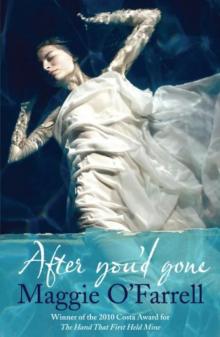 After You'd Gone
After You'd Gone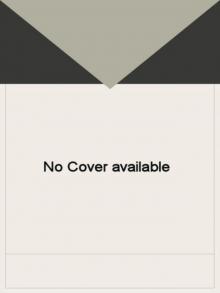 The Hand That First Held Mine
The Hand That First Held Mine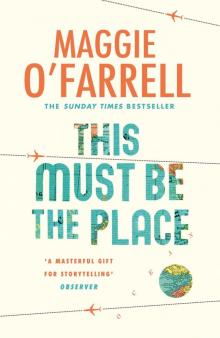 This Must Be the Place
This Must Be the Place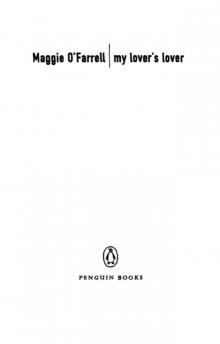 My Lover's Lover
My Lover's Lover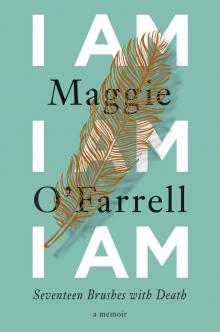 I Am, I Am, I Am: Seventeen Brushes With Death
I Am, I Am, I Am: Seventeen Brushes With Death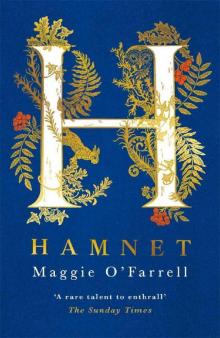 Hamnet
Hamnet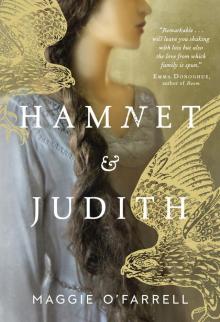 Hamnet and Judith
Hamnet and Judith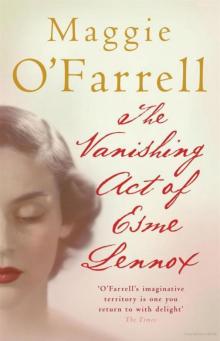 The Vanishing Act of Esme Lennox
The Vanishing Act of Esme Lennox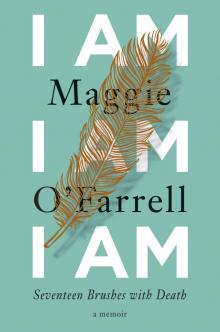 I Am, I Am, I Am
I Am, I Am, I Am